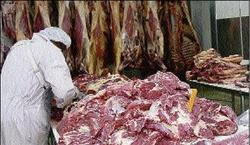Shelly-Ann Thompson, Staff Reporter

Butchers are obligated to inform the medical officer of health, the police and the parish council of plans to slaughter animals. - File
Director of veterinary public health in the Ministry of Health and Environment, Dr Linnette Peters, says Jamaica's hopes of curbing praedial larceny rest with the adoption of a culture which unequivocally condemns theft.
"We have a country where we have a lot of thieves. We need a culture change," she added.
Peters said public health inspectors should not be blamed when stolen meats end up at the marketplace.
The director said stolen meats are often not passed through the legal system of butchering.
Butchers should ensure that animals for slaughter are received from registered farmers or persons who have proof of purchase.
Public health inspectors, on the other hand, are only present when animals are slaughtered. If the animals are healthy and safety procedures are adhered to, the health inspector approves the meat for consumption.
Every butcher is required to inform the medical officer of health, the police and the parish council when an animal is being slaughtered.
Work gone to waste
"We have farmers who put in so much work, and at the end of the day someone comes and takes that animal. We need to change that," said Peters.
An agronomist and an agricul-turist shared similar sentiments.
Dr Joseph Lindsay, agronomist, said attacking praedial larceny requires a national resolve by which the country is engaged in an awareness programme grounded in ethics and morality.
"It's (praedial larceny) a major cultural problem. The whole problem of values and attitudes teaching everyone, from the home and within the community, that it is not right to take someone's property," said Lindsay.
"The police are already overworked," added Lindsay, who was director of research at Bodles, the research and development division of the Ministry of Agriculture.
Chairman of Jamaica Organic Agriculture Movement, Raymond Martin, was vociferous in his condemnation of praedial thieves.
"We have to get a culture where people stop stealing," said Martin.
The Government has said that praedial larceny constitutes one of the greatest impediments to the development of agriculture in the island.
WE WANT TO HEAR FROM YOU!Having a problem with praedial thieves? We want to hear from you. Tel: 932-6205; fax: 922-6223;
email us: editor@gleanerjm.com.

